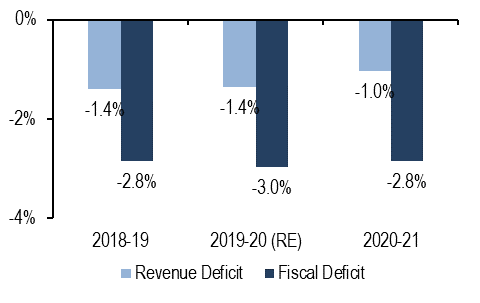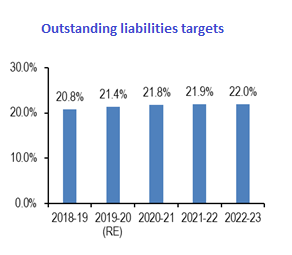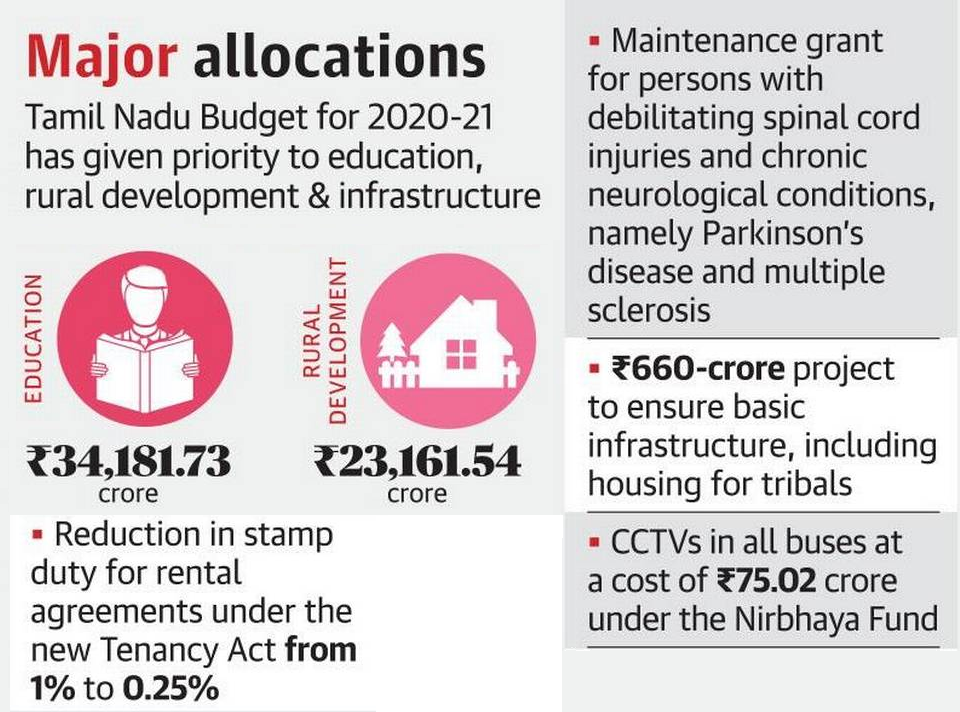PREVIOUS
Tamil Nadu Budget 2020-21
March 14 , 2020
1854 days
14821
0
- Deputy Chief Minister and State Finance Minister O. Panneerselvam presented the State Budget in the Assembly for the 10th time on February 14.
Economy in Numbers
- Tamil Nadu’s economic growth for 2019-20 is projected to be 7.27%, a fall from 8.17% in 2018-19 due to global and national economic headwinds.
- The Gross State Domestic Product of Tamil Nadu for 2020-21 (at current prices) is projected to be Rs 20,91,927 crore.

- Total expenditure for 2020-21 is estimated to be Rs 3,00,390 crore.
- Total receipts (excluding borrowings) for 2020-21 are estimated to be Rs 2,24,739 crore.
- Tamil Nadu state own tax revenue is estimated at ₹1.49 lakh crore for 2020-21.
- Rs 69,946 crore (32% of the revenue receipts) will be in the form of central transfers, i.e. state’s share in central taxes and grants-in-aid from the central government.
- Revenue deficit for 2020-21 is targeted at Rs 21,618 crore, or 1.03% of the Gross State Domestic Product (GSDP).
- Fiscal deficit is targeted at Rs 59,346 crore (2.84% of GSDP).
- The estimate is lower than the 3% limit as per the FRBM Act.
- This limit may be relaxed to a maximum of 3.5% of GSDP, if states are able to contain their debt and interest payments to certain specified levels.

- The per capita GSDP of Tamil Nadu in 2018-19 (at constant prices) was Rs 1,56,041 crores.
- This is 7% higher than that in 2017-18.
- The outstanding debt at the end of March 2020 will be around Rs 3,97,495.96 crore.
- The outstanding debt expected to touch Rs.4.56 lakh crore by March 31, 2021.
- The Government says outstanding debt is 21.83 % of GSDP in 2020-21 which is within the norms of Tamil Nadu Fiscal Responsibility Act, 2003.
- In 2020-21, Tamil Nadu is expected to spend Rs 52,616 crore on servicing its debt.

Important Announcements
- Eco-restoration of the Buckingham Canal, its drains and all the drains of the Cooum and Adyar at a total cost of ₹5,439.76 crore to be taken up
- Environmental Clearance for Athikadavu-Avinashi irrigation scheme has been obtained, ₹500 crore provided in the budget for the project
- Food parks proposed to be established in Dharmapuri, Ariyalur, Perambalur, Karur, Nagapattinam, Ramanathapuram, Tenkasi districts at a cost of ₹70 crore.
- The government has decided to form a 'not-for-profit' Special Purpose Vehicle to finance and manage the Amma Unavagam programme
- Agro Processing Clusters proposed to be established in Theni, Dindigul, Krishnagiri, Tiruvannamalai, Salem Cuddalore, Villupuram and Madurai districts in 2020-21 under PM Kisan programme
- Government to set up industrial park near Ponneri in Tiruvallur district.
- Government to take over Raja Muthaiah Medical College in Annamalai University and rename it as Government Cuddalore Medical College.
- Tamil Nadu govt to start old age homes in districts on a pilot basis
- Government plans to bring in legislation to recognise Madras School of Economics, headed by former RBI Governor Dr C Rangarajan, as an institute of Special Importance and enable MSE to award its own degrees and diplomas.
- According to the annual report of the Periodic Labour Force Survey (2017-18), Tamil Nadu has one of the lowest unemployment rates at 3.5% as compared to the all-India unemployment rate of 6.0%.
Sector specific allocations
- In 2020-21, the sectors of Energy (37%), Transport (27%), and Water Supply, Sanitation, Housing and Urban Development (25%) saw the highest increase in allocations over the revised estimate of previous year.
- ₹11,894.48 crore allocated for Agriculture department
- ₹31.93 crore allocated for Department of Archaeology.

- The Government has sanctioned Rs 12.21 Crores for the establishment of a world-class new museum at Keezhadi.
- ₹1,200 crore provided in the budget estimates for establishing 11 new medical colleges already announced
- ₹38,181.73 crore allocated for School Education Department, ₹5,052.84 crore for Higher Education.
- Tamil Nadu has allocated 15% of its expenditure on education in 2020-21. This is marginally lower than the average budget allocation for education by 29 states.
- Tamil Nadu has allocated 5.7% of its total expenditure on health, which is higher than the average expenditure of 29 states
- In 2020-21, Tamil Nadu is estimated to spend Rs 1,36,098 crore on committed expenditure, i.e. payment of salaries, pensions, and interest.
- TN government announces reduction in Stamp Duty for rental agreements under the new Tenancy Act to 0.25% from 1% and registration charges on such agreements to 0.25% from 1% subject to a maximum of ₹5,000.
Policy highlights
- The government has proposed the Tamil Nadu Urban Flagship Investment Programme to support the state in developing urban and environmental infrastructure.
- The programme will be financed with assistance from the Asian Development Bank.
- A comprehensive flood mitigation project for Greater Chennai has been proposed
- This will be undertaken with assistance from the World Bank and Asian Infrastructure Investment Bank.
GST Compensation:
- The GST (Compensation to States) Act, 2017 guarantees states compensation for five years (till 2022) for any revenue loss arising due to GST implementation.
- The Act guarantees states a 14% annual growth on their revenue which was subsumed under GST.
- If the GST revenue of a state does not match the guaranteed growth, compensation grants are provided to meet the shortfall.
15th Finance Commission’s recommendations for 2020-21
- The 15th Finance Commission’s (15th FC) report for the financial year 2020-21 was tabled in Parliament on February 1, 2020.
- The 15th FC recommended a 41% share for states in the central government’s tax revenue in 2020-21, a 1% decrease from the 42% share recommended by the 14th FC (2015-20).
- The 1% decrease is to provide funds to the newly formed union territories of Jammu and Kashmir, and Ladakh from the share of the central government.
- The 15th FC also proposed revised criteria for determining the share of individual states.
- The 15th FC has recommended a 1.72% share for Tamil Nadu in the centre’s tax revenue for 2020-21 (same as the share recommended by the 14th FC for 2015-20).
- This implies that out of every Rs 100 of centre’s tax revenue in 2020-21, Tamil Nadu will receive Rs 1.72.
ó ó ó ó ó ó ó ó ó ó
Leave a Reply
Your Comment is awaiting moderation.


